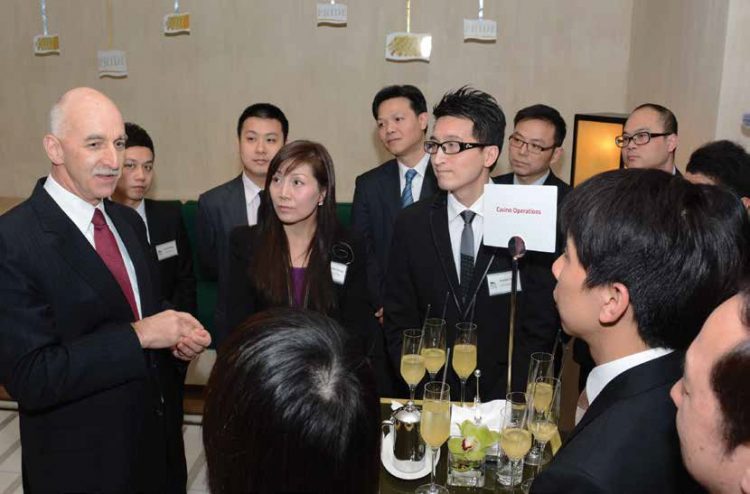The customer experience at a casino in Macau is vastly different to that in Las Vegas. A major reason for that is how staff are trained in each place. Virgil Chan of Synergy Corp., who conducts training for gaming employees, explains the workings of employee development in the city and how to improve it
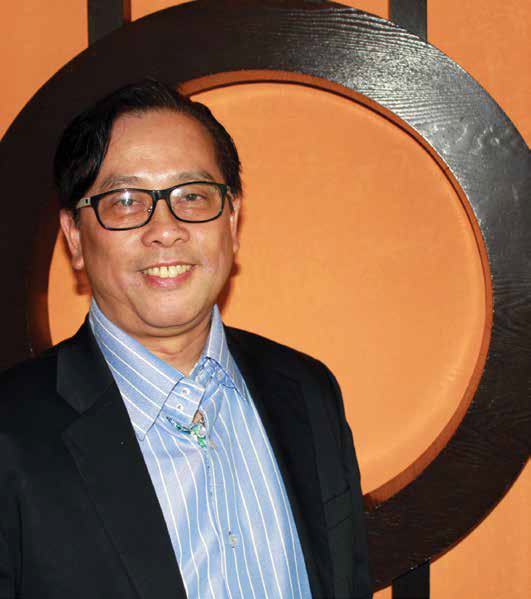
In his latest policy address, Macau Chief Executive Fernando Chui Sai On explicitly called on the city’s casino operators to promote more local gaming workers into the ranks of management. Operators have responded by highlighting the resources they are devoting to promoting what one called “the lifelong learning and whole person development” of its staff, and another termed as “investing in the future leaders of Macau”. Although Macau’s casinos have started offering regular training to their employees—particularly the younger ones—according to Virgil Chan, who trains workers for both casinos and major junkets in the city, most still don’t realize the full potential to be realized by offering training beyond basic skills to their employees and so are not yet truly committed to the cause. Mr Chan, principal consultant at Synergy Corp., sat down with Inside Asian Gaming recently to share his thoughts on the city’s pressing labor issues, from the quality of staff to the mounting dissatisfaction of workers aired in recent protests.
IAG : With unemployment running at a mere 1.7% in Macau, the labor market here is so tight that casinos have started to fill dealer positions with workers they would previously not have considered suitable, including older and less-skilled workers. Have you seen a drop in the quality of staff you are training?
Mr Chan: Not really. Actually, I don’t train a lot of old people. It’s a pragmatic decision by the casinos, which channel most training resources towards their younger staff. They want to invest in workers in their 20s who may give them a few more years of service. If you look at the casinos these days, there are many middle-aged ladies working as dealers on the floor who have the basic skills to do the job. They are not encouraged to interact with customers, so all they have to do is smile, be courteous and efficient.
The older generation also does not have a lot of education and they are not really looking for a career. Even if you ask them to attend a supervisor training course, they will respond, “Why should I? I am not going to get promoted. I don’t have the qualifications and the education. All I want to do is peacefully and quietly work my next 10 years as a dealer, and I’m already making more than I would cleaning tables or doing dishes.”
But are you concerned these older workers are not getting enough training? Especially because the casinos will probably have to hire even more of them over the next few years to staff their new Cotai properties, which will start to come online from next year?
No, because their jobs are so limited. The casinos just need to make sure the hard skills of those workers are taught properly— teaching them how to deal cards, not to make mistakes and to smile when necessary. We don’t expect them to interact with the customers. If one day the casinos here decide the dealers need to interact with customers like the ones in Las Vegas do, maybe it will be necessary to train them more then.
Another feature of Macau’s labor market is that it’s common for staff to frequently switch jobs, with many leaving companies right after they receive training. Could this lead to companies regarding training as waste of resources?
We try to educate management. We tell them if they manage to build some loyalty and some team spirit the staff will probably stay longer. It’s a choice between having unskilled, unmotivated staff who will leave anyway and having skilled, motivated staff who may stay a little longer. In the past, management thought: “I train them and they leave. What’s the point?” Now they realize if you train them you could get to keep them and they will become assets. The attitude towards training is slowly changing, and we have a few successful examples, like a junket that has been able to maintain its staff turnover at just 2%.
Also, some training is aimed explicitly at retaining people. We do a lot of teambuilding exercises for both casinos and junkets. Hopefully, through these exercises, the staff can learn the value of being part of a team and become more loyal towards their company. That’s why we see junkets with staff turnover of 2% or 3%, and others with turnover of over 20%. Casino operators are huge, so their turnover is always in the double-digits.
In line with the government’s mandate that more locals rather than foreigners occupy senior positions in casinos, we’v seen many locals promoted to roles they are arguably not yet qualified for. Have you been called in to offer training to these people?
Most of the training resources these days go to the supervisory level—supervisors and junior management—not to senior management. We are called in to teach a variety of things, from soft skills like EQ to basic office skills, like how to use Excel to prepare a budget. But we’re not generally called in to teach leadership skills, because [the casinos] don’t see these staff as leaders anytime soon. The casinos just need them to manage the 20 staff under them. Casinos have to be very tightly structured because of all the money involved and the need for security.
What types of training do junkets provide their staff?
Junkets got into training within the last four or five years, starting with the biggest one, Suncity Group. Suncity decided to start offering training to its staff in order to be more competitive in the market, and slowly all the other major junkets saw the need for it. Junkets have started to manage themselves very differently, and now some of them are listed companies, so they have to have proper governance, proper training.
Is there a difference between the courses offered for the staff in the casinos and the junkets?
They are very different. Most casino operators have very clear internal guidelines stating that employees need to get trained for 30 hours a year, and they have brought in many different types of training—all sorts of skills, including those related to performing specific jobs as well as soft skills, which are mostly what I train, such as communications and personal relations.
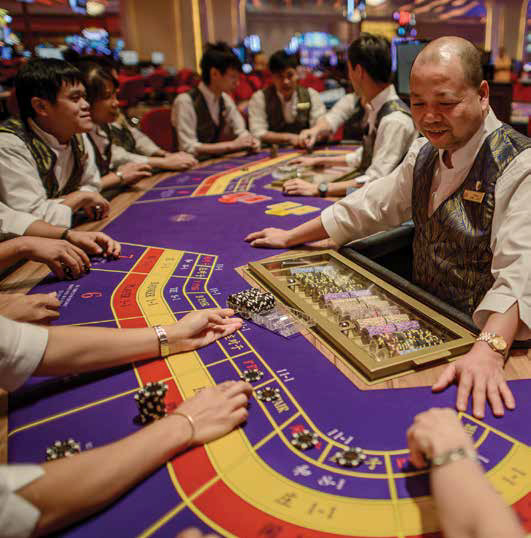
How is your training different to that offered by the human resources departments of the casinos?
Usually, they don’t have a lot of trainers. Their training departments consist of a bunch of coordinating people. They train a little bit, but not a lot, and focus on the hard skills. Some of their trainers come from individual departments. Take the F&B department, for example. It would train its own people how to perform the tasks required of them, and HR would help arrange it.
What are the major topics covered in your training?
It depends on where the staff is on the curve. But the biggest one is still customer service. If they are just starting out, we start with the basic customer service skills and explain to them why people come to gamble. Most of them still have the notion that people come to gamble because they want to win money. This is partly true, but on the other hand, gamblers have other expectations.
We ask the staff: “If people do come and want to win money, can we deliver a win? We cannot. So it’s better to look at it as paying for a service—they come and get entertained, and we charge them a little bit of money to entertain them.” People in the gaming industry need to understand we are a fee-charging industry. Customers’ expectations of winning money cannot be fulfilled, and we have to look at all their other needs and see what we can do to make them happy.
Many gamblers believe in patterns and luck. How do you train the staff about these things?
It’s a little bit tricky, a bit of a dilemma. They have to know that all those things are not real, and yet, they need to be able to talk to customers about them because it’s an important part of the experience for many players.
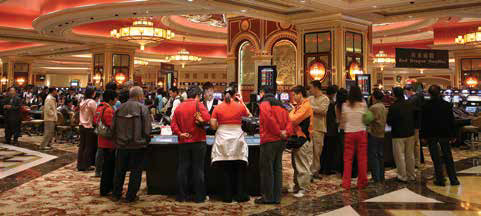
We don’t see the staff engage a lot with the players in Macau casinos. Unlike staff at casinos in the West, they don’t talk to the customers and often don’t even smile at them.
Some casinos allow dealers to have limited conversations with the players, while some instruct them to have only necessary communication. This stems from a very old belief that dealers might work with the players and conduct fraud. If the dealers know the players well they may join forces with them and cheat the casino. We are trying to get the management to understand the Las Vegas style of having staff engage with the customers.
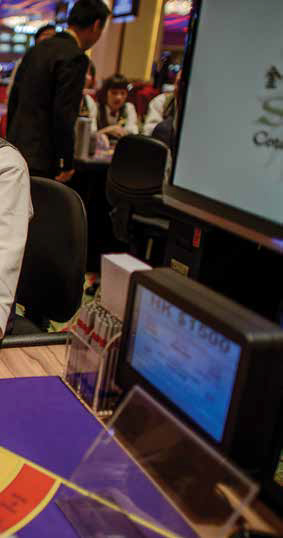
Does management now want to train their staff to be more like the casino staff found in Las Vegas?
Not yet. It has to do with security and a lot of other issues. The casinos here also don’t see the competition as intense as it is in Las Vegas because everybody is making money. The junkets are seeing the pressure, though, because their contribution to total gaming revenue is shrinking. The number of VIP players is shrinking, so the junkets have to do better to keep their customers. For the casinos the mass market is growing and they are making a lot of money so customer service is important but not as much of a priority.
Training in Macau is only a pressing need when you have a problem. It has not been a high-priority item because it is not something that you undertake today and see the result tomorrow. Actually, the hardest part of training is to make management see things differently. We are doing more and more management-level training, but that’s not easy because they are so entrenched in their old ways of thinking. There are simple rules when it comes to customer service. Rule No. 1: If you want your customers to be happy, you need to make sure your staff are happy. How can you make your customers happy if your staff are grumpy every day?
So would you say casino staff are more or less happy now than they were before?
We haven’t done any research on this, but in general they have become more vocal about their needs. We are not sure whether they are not as happy or they are just more vocal. There are many reasons for them having become more vocal. Part of it is the current political climate, and the other part is they might have been unhappy over the past 10 years and finally now they feel they should voice their opinions.

What do you think about the way casinos have been dealing with recent protests by their staff? It seems their main response is to hand out money to placate them.
The casinos haven’t had to deal with these demands for a long time because their staff haven’t been very vocal in the past. Now it seems the casinos only deal with labor issues when workers voice their discontent. But they need to deal with them in a more systematic way. The casinos really need to understand why their staff are unhappy. Everybody wants a little bit more money, but there’s more to it than that. The casinos cannot continuously give in to the demands of their staff. There are deeper issues, and companies need to address the underlying reasons of why their staff are unhappy.






